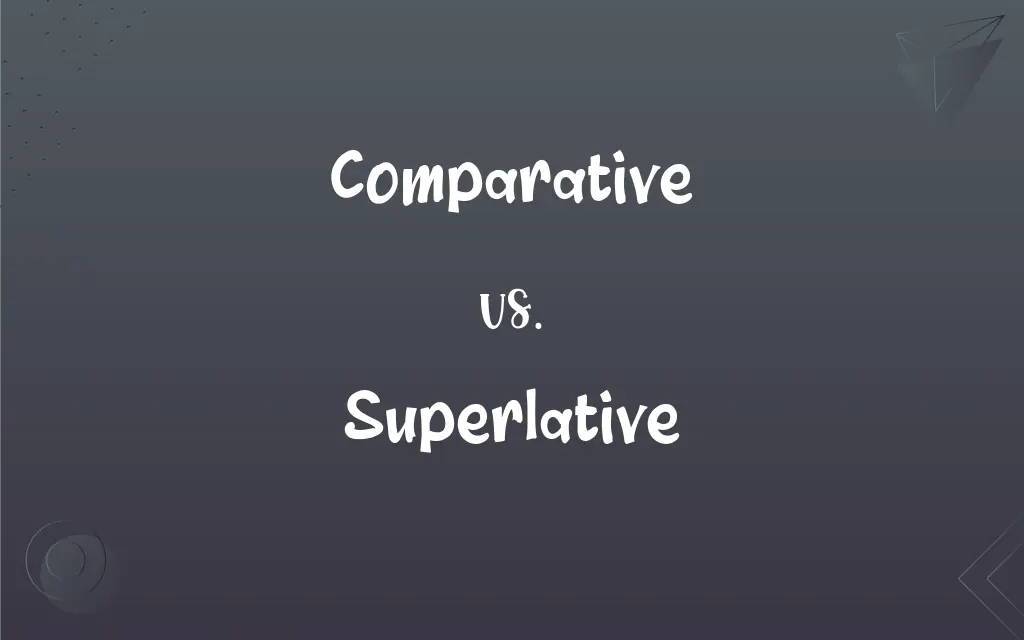Comparative vs. Superlative: What's the Difference?
Edited by Aimie Carlson || By Harlon Moss || Updated on October 17, 2023
Comparatives compare two things (e.g., "taller"), while superlatives indicate the highest degree among three or more (e.g., "tallest").

Key Differences
Comparatives and superlatives are forms of adjectives or adverbs used to make comparisons. Comparative forms typically compare two items or sets, indicating how one is more or less of something than the other. Superlative forms, conversely, highlight the highest degree or extreme of something among three or more items or sets.
In terms of structure, comparatives usually have "er" endings or are preceded by "more" or "less." For instance, "brighter" or "more colorful" are comparative forms. Superlatives, on the other hand, often have "est" endings or are introduced by "most" or "least." Examples include "brightest" and "most colorful."
Applying comparatives and superlatives accurately in sentences is crucial for clarity. Consider the sentences, "She is the smarter student" and "She is the smartest student." The comparative form in the former indicates she's smarter than one other student, while the superlative in the latter suggests she's the smartest among all students in a larger group.
To sum up, while both comparatives and superlatives are tools to make comparisons, they differ in scope and structure. Comparatives are used for two items, indicating a relative difference, while superlatives denote the highest degree among three or more items.
Comparison Chart
Function
Compares two things.
Indicates the highest degree among three or more things.
ADVERTISEMENT
Typical Structure
Often ends in "er" or uses "more/less."
Often ends in "est" or uses "most/least."
Number of Items Compared
Two items.
Three or more items.
Example (Adjective)
"She is taller than him."
"She is the tallest in the class."
Example (Adverb)
"He runs faster than she does."
"He runs the fastest of all the students."
Comparative and Superlative Definitions
Comparative
Relative, not absolute or positive.
The benefits are enormous in comparative terms.
ADVERTISEMENT
Superlative
Expressing the highest or a very high degree of an adjective or adverb.
The superlative form of 'happy' is 'happiest'.
Comparative
Of or relating to comparative linguistics.
He specializes in comparative phonology.
Superlative
Exaggerated or hyperbolical in expression.
His praise was so superlative that it seemed insincere.
Comparative
Of or relating to the degree of an adjective or adverb that compares differences between two items.
The comparative form of 'big' is 'bigger'.
Superlative
Supreme or outstanding.
She has superlative skills in painting.
Comparative
Pertaining to or based on comparison.
He made a comparative study of the two novels.
Superlative
Of the highest quality, order, or degree.
She received superlative reviews for her performance.
Comparative
Estimated by comparison; not positive or absolute.
She had a comparative freedom at her new job.
Superlative
Of utmost importance or significance.
The event was of superlative importance to the community.
Comparative
Relating to, based on, or involving comparison.
Superlative
Of the highest order, quality, or degree; surpassing or superior to all others.
Comparative
Of or relating to the scientific or historical comparison of different phenomena, institutions, or objects, such as languages, legal systems, or anatomical structures, in an effort to understand their origins or relationships.
Superlative
Excessive or exaggerated.
FAQs
What is the main function of a comparative?
Comparatives compare differences between two things.
How is the superlative form used?
Superlatives indicate the highest degree among three or more things.
And a superlative adverb?
"Most quickly" is the superlative form of "quickly."
Can you give an example of a comparative adjective?
Sure, "older" is the comparative form of "old."
How about an example of a superlative adjective?
Certainly, "oldest" is the superlative form of "old."
How do I form a comparative for most one-syllable adjectives?
Add "er" to the end, like "tall" becomes "taller."
Can some words have irregular comparative and superlative forms?
Yes, like "good" becomes "better" (comparative) and "best" (superlative).
Why is it important to correctly use comparatives and superlatives?
Proper use ensures clarity in comparisons and avoids confusion for the reader or listener.
And superlatives?
Superlatives compare three or more things.
What's an example of a comparative used in a sentence?
"She is smarter than him."
Are there rules for when to add "er/est" and when to use "more/most"?
Generally, one-syllable words take "er/est" and multi-syllable words take "more/most," but there are exceptions.
Can comparatives and superlatives be used for nouns?
No, they're forms of adjectives or adverbs.
How many things does a comparative typically compare?
Comparatives typically compare two things.
How about a superlative for one-syllable adjectives?
Add "est" to the end, like "tall" becomes "tallest."
For longer adjectives, how do I form a comparative?
Use "more" before the adjective, like "beautiful" becomes "more beautiful."
And the superlative form?
Use "most" before the adjective, like "beautiful" becomes "most beautiful."
Can "less" and "least" be used for comparatives and superlatives?
Yes, for negative comparisons, like "less interesting" (comparative) and "least interesting" (superlative).
Can you give an example of a comparative adverb?
Yes, "more quickly" is the comparative form of "quickly."
How about a superlative in a sentence?
"She is the smartest student in the class."
Do all adjectives and adverbs have comparative and superlative forms?
No, some adjectives and adverbs, especially those denoting absolute qualities, don't usually have these forms, like "unique."
About Author
Written by
Harlon MossHarlon is a seasoned quality moderator and accomplished content writer for Difference Wiki. An alumnus of the prestigious University of California, he earned his degree in Computer Science. Leveraging his academic background, Harlon brings a meticulous and informed perspective to his work, ensuring content accuracy and excellence.
Edited by
Aimie CarlsonAimie Carlson, holding a master's degree in English literature, is a fervent English language enthusiast. She lends her writing talents to Difference Wiki, a prominent website that specializes in comparisons, offering readers insightful analyses that both captivate and inform.































































